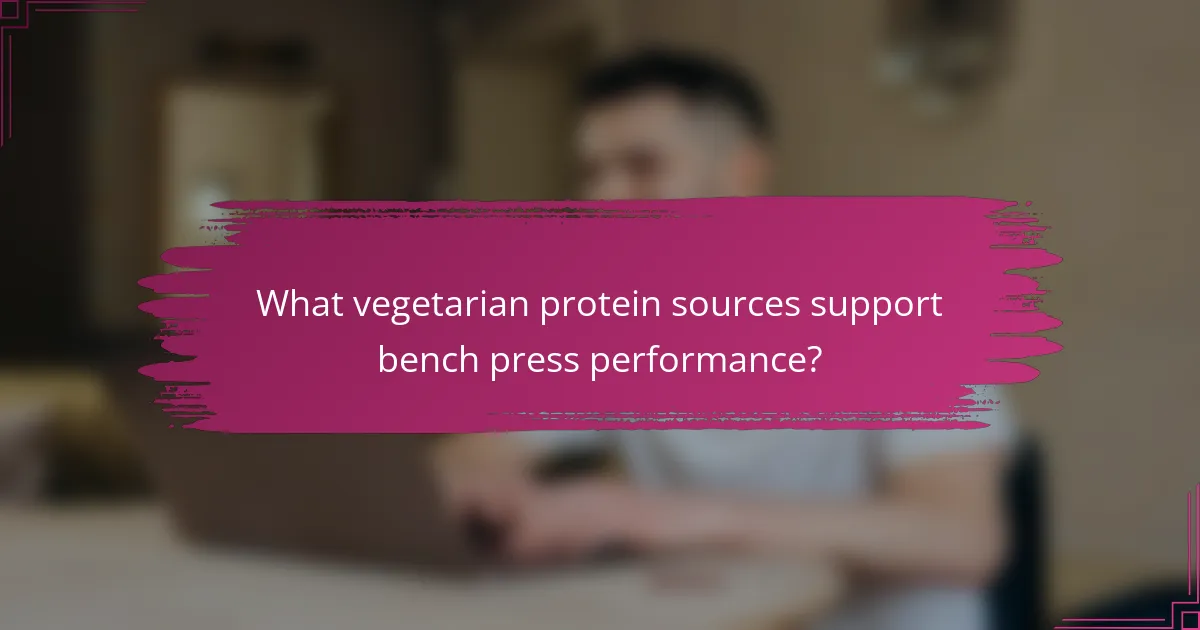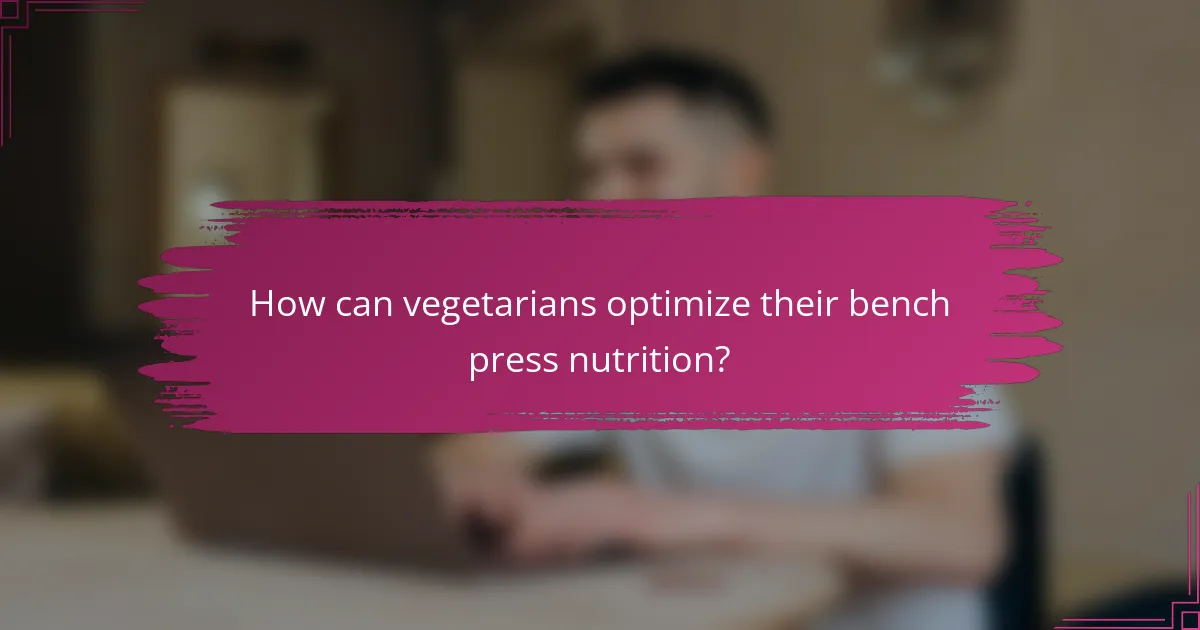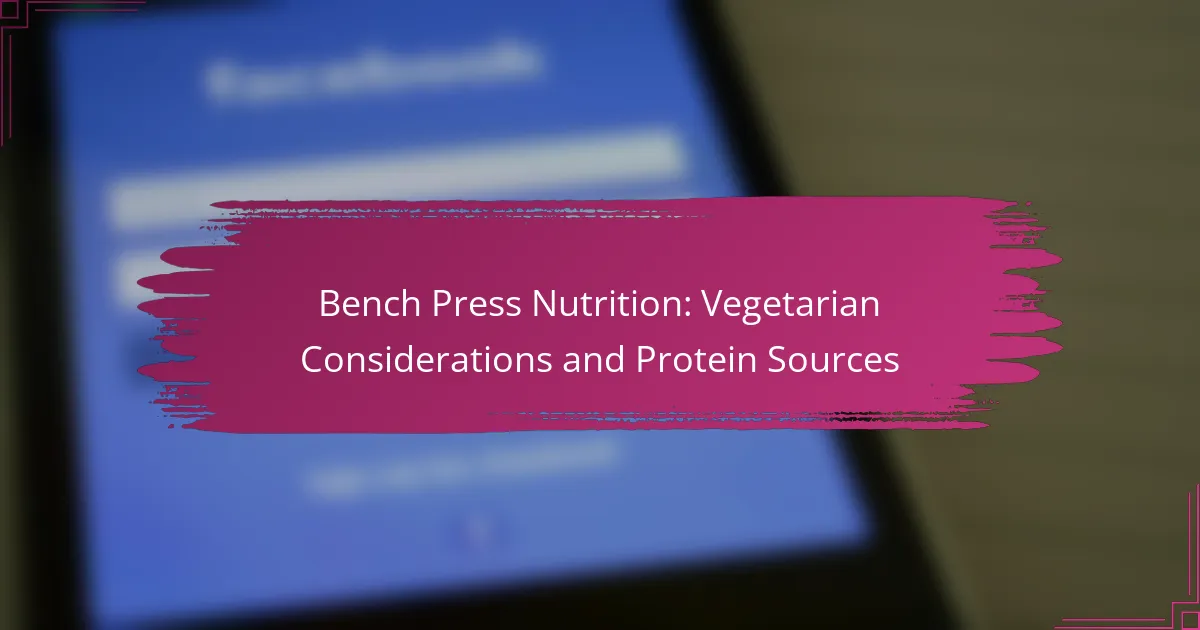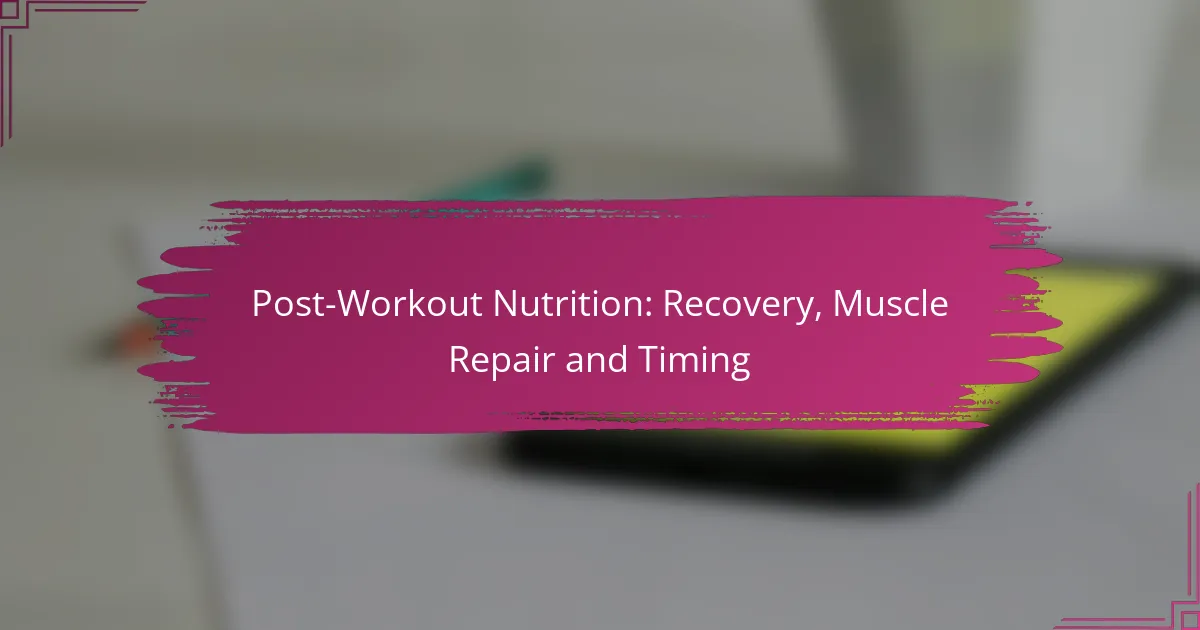For vegetarians looking to enhance their bench press performance, understanding the right nutrition is crucial. By incorporating a variety of protein-rich plant sources and balancing macronutrients, individuals can ensure they meet their protein needs for muscle repair and growth. Strategic meal timing and a focus on overall caloric intake further support effective strength training and recovery.

What vegetarian protein sources support bench press performance?
Vegetarian protein sources can effectively support bench press performance by providing essential amino acids necessary for muscle repair and growth. Incorporating a variety of these sources ensures adequate protein intake for optimal strength training results.
Legumes and beans
Legumes and beans, such as lentils, chickpeas, and black beans, are excellent protein sources for vegetarians. They typically contain around 15-25 grams of protein per cooked cup, along with fiber and essential nutrients that aid in recovery and overall health.
Incorporating legumes into meals can be simple; consider adding them to salads, soups, or as a base for veggie burgers. Aim to include them in your diet several times a week for maximum benefit.
Quinoa
Quinoa is a complete protein, meaning it contains all nine essential amino acids, making it a valuable addition to a vegetarian diet. One cooked cup of quinoa provides approximately 8 grams of protein, along with a good amount of fiber and minerals.
Use quinoa as a side dish, in salads, or as a base for grain bowls. It can be a versatile ingredient, easily paired with vegetables and legumes to enhance your protein intake.
Tofu and tempeh
Tofu and tempeh are both derived from soybeans and are rich in protein, with tofu offering about 10 grams per half-cup and tempeh providing around 15 grams. They are also good sources of calcium and iron, which are important for muscle function and recovery.
These soy products can be grilled, stir-fried, or added to soups and salads. Experiment with different marinades and cooking methods to keep meals interesting while boosting protein levels.
Nuts and seeds
Nuts and seeds, such as almonds, chia seeds, and hemp seeds, provide healthy fats along with protein. A handful of nuts can deliver about 6-8 grams of protein, while seeds can offer around 5-10 grams per ounce, depending on the type.
Incorporate nuts and seeds into snacks, smoothies, or as toppings for yogurt and salads. Keep portion sizes in check, as they are calorie-dense, but their nutritional benefits make them a worthwhile addition to your diet.
Plant-based protein powders
Plant-based protein powders, such as pea, rice, or hemp protein, can be an effective way to increase protein intake, especially for those engaged in intense training. These powders typically provide 15-25 grams of protein per serving and can be easily added to smoothies or oatmeal.
When choosing a protein powder, look for products with minimal additives and a balanced amino acid profile. This can help ensure you are getting quality nutrition to support your bench press performance.

How can vegetarians optimize their bench press nutrition?
Vegetarians can enhance their bench press nutrition by focusing on protein-rich plant sources, balanced macronutrients, and strategic meal timing. By ensuring adequate protein intake and proper nutrient distribution, they can support muscle growth and recovery effectively.
Balanced macronutrient intake
A balanced intake of macronutrients—proteins, carbohydrates, and fats—is crucial for vegetarians aiming to optimize their bench press performance. Aim for a protein intake of around 1.6 to 2.2 grams per kilogram of body weight, sourced from legumes, tofu, tempeh, and dairy products if included in the diet.
Carbohydrates should make up a significant portion of the diet, providing energy for workouts. Whole grains, fruits, and vegetables are excellent sources. Healthy fats from nuts, seeds, and avocados also play a vital role in hormone production and overall health.
Meal timing strategies
Meal timing can significantly impact performance and recovery for vegetarians. Consuming a protein-rich meal or snack within 30 to 60 minutes post-workout can help stimulate muscle repair. Consider options like a smoothie with protein powder, almond milk, and a banana.
Additionally, spreading protein intake throughout the day—aiming for 20 to 30 grams per meal—can enhance muscle protein synthesis. Pre-workout meals should focus on easily digestible carbohydrates to fuel the workout, such as oatmeal or a piece of fruit.
Hydration importance
Staying well-hydrated is essential for optimal performance in bench pressing. Dehydration can lead to decreased strength and endurance, so aim to drink water consistently throughout the day. A general guideline is to consume at least 2 to 3 liters of water daily, adjusting based on activity level and climate.
Incorporating electrolyte-rich beverages during intense training sessions can also be beneficial, especially if workouts exceed an hour. This helps maintain electrolyte balance and supports muscle function, which is crucial for vegetarians who may have lower sodium intake from processed foods.

What are the best vegetarian meal plans for bench press training?
The best vegetarian meal plans for bench press training focus on high protein intake, balanced macronutrients, and adequate calories to support muscle growth and recovery. Incorporating a variety of plant-based protein sources, healthy fats, and complex carbohydrates is essential for optimal performance.
Sample meal plan one
This meal plan emphasizes protein-rich foods and includes a variety of nutrients to fuel your workouts. Start with a breakfast of oatmeal topped with almond butter and sliced bananas, providing both carbs and healthy fats. For lunch, consider a quinoa salad with black beans, bell peppers, and avocado, which offers a complete protein source.
For dinner, a stir-fry with tofu, broccoli, and brown rice can be a satisfying option. Snacking on Greek yogurt with berries or a handful of nuts throughout the day can help meet your protein needs while keeping energy levels stable.
Sample meal plan two
This alternative meal plan focuses on diverse protein sources and nutrient density. Begin your day with a smoothie made from spinach, protein powder, and a banana, ensuring you get a good start on your protein intake. Lunch could feature a lentil soup paired with whole-grain bread, providing fiber and essential vitamins.
For dinner, try a chickpea curry served with basmati rice, which combines protein and carbohydrates effectively. Include snacks like hummus with carrot sticks or a protein bar to maintain energy and support muscle repair throughout the day.

How do vegetarian protein needs differ for bench press athletes?
Vegetarian bench press athletes typically have higher protein needs compared to their omnivorous counterparts due to the lower protein density of plant-based foods. To effectively support muscle growth and recovery, vegetarians must carefully select protein sources that meet their dietary requirements.
Increased protein requirements
Bench press athletes generally require more protein to support muscle repair and growth, often around 1.6 to 2.2 grams of protein per kilogram of body weight. For vegetarians, achieving this target can be challenging, as plant proteins may not provide the same amount of protein per serving as animal sources. Therefore, it is crucial for vegetarian athletes to consume a variety of protein-rich foods throughout the day.
Incorporating protein-dense foods such as legumes, tofu, tempeh, and seitan can help meet these increased needs. Additionally, protein supplements like pea or rice protein can be beneficial for those struggling to reach their targets through whole foods alone.
Essential amino acids focus
Vegetarian athletes must pay special attention to essential amino acids (EAAs), which are crucial for muscle synthesis. Unlike animal proteins, many plant proteins are considered incomplete, meaning they lack one or more EAAs. To ensure adequate intake, vegetarians should combine different protein sources, such as rice and beans, to create a complete amino acid profile.
Focusing on high-quality plant proteins, such as quinoa, soy products, and hemp seeds, can help provide all essential amino acids. Regularly including a variety of these sources in meals will support optimal muscle recovery and performance for bench press athletes.

What supplements can enhance vegetarian bench press nutrition?
Vegetarian athletes can enhance their bench press nutrition with specific supplements that support muscle growth and recovery. Key options include creatine monohydrate and branched-chain amino acids (BCAAs), both of which can help improve performance and muscle synthesis.
Creatine monohydrate
Creatine monohydrate is a popular supplement known for its ability to increase strength and power during high-intensity workouts. For vegetarians, it can be particularly beneficial since plant-based diets typically contain lower levels of creatine.
When considering creatine supplementation, a common approach is to start with a loading phase of around 20 grams per day for five to seven days, followed by a maintenance dose of 3 to 5 grams daily. This can help saturate muscle stores and enhance performance during bench press sessions.
Always ensure adequate hydration when taking creatine, as it can increase water retention in muscles. Additionally, consult with a healthcare provider to determine the best approach for your individual needs.
Branched-chain amino acids (BCAAs)
Branched-chain amino acids (BCAAs) consist of three essential amino acids: leucine, isoleucine, and valine. They play a crucial role in muscle protein synthesis and can help reduce muscle soreness after intense workouts, making them a valuable addition to a vegetarian diet.
A typical dosage for BCAAs ranges from 5 to 10 grams before or after workouts. This can help enhance recovery and support muscle growth, especially for those who may not consume enough protein from plant sources alone.
When selecting a BCAA supplement, look for products that contain a higher ratio of leucine, as it is the most effective in stimulating muscle protein synthesis. Always check for any added sugars or fillers that may not align with your dietary preferences.

How can vegetarians ensure adequate iron intake for strength training?
Vegetarians can ensure adequate iron intake for strength training by incorporating a variety of iron-rich plant foods and using strategies to enhance iron absorption. Since plant-based iron (non-heme iron) is less readily absorbed than animal sources, attention to dietary choices and combinations is essential.
Iron-rich plant foods
Some excellent sources of iron for vegetarians include lentils, chickpeas, beans, tofu, quinoa, and fortified cereals. Dark leafy greens like spinach and kale also provide iron, though the amount can vary. Nuts and seeds, particularly pumpkin seeds and cashews, are additional options that can contribute to daily iron intake.
To maximize iron consumption, aim for a variety of these foods throughout the week. For example, including a serving of lentils in a meal can provide a significant portion of the daily iron requirement, which is around 14-18 mg for most adults, depending on age and gender.
Iron absorption tips
To enhance iron absorption from plant sources, pair iron-rich foods with vitamin C-rich items like citrus fruits, bell peppers, or tomatoes. This combination can significantly improve the uptake of non-heme iron. Avoid consuming calcium-rich foods or beverages, such as dairy or fortified plant milks, at the same time as iron sources, as calcium can inhibit iron absorption.
Additionally, cooking methods can impact iron availability; for instance, using cast iron cookware can increase the iron content of foods. Regularly monitoring iron levels through blood tests can help ensure that dietary adjustments are effective in meeting strength training needs.

What are common misconceptions about vegetarian diets and strength training?
Many believe that vegetarian diets cannot support strength training effectively, often due to misconceptions about protein sources and quality. In reality, with proper planning, vegetarians can meet their protein needs and achieve strength goals just as well as their omnivorous counterparts.
Protein quality myths
A common myth is that plant-based proteins are inferior to animal proteins. While animal proteins are complete, meaning they contain all essential amino acids, many plant proteins can also provide adequate nutrition when combined properly. For example, pairing beans with rice or nuts with whole grains can create a complete protein profile.
Another misconception is that vegetarians need to consume protein in large quantities to match the muscle-building potential of meat-eaters. In fact, most active individuals require around 1.2 to 2.0 grams of protein per kilogram of body weight, regardless of the source. Focusing on a variety of protein sources, such as legumes, tofu, tempeh, and quinoa, can help meet these needs effectively.
It’s also important to consider the digestibility of protein sources. While some plant proteins may be less digestible than animal proteins, incorporating a range of sources can enhance overall protein absorption. For instance, consuming protein-rich foods alongside vitamin C sources, like bell peppers or citrus fruits, can improve iron absorption from plant-based foods.



